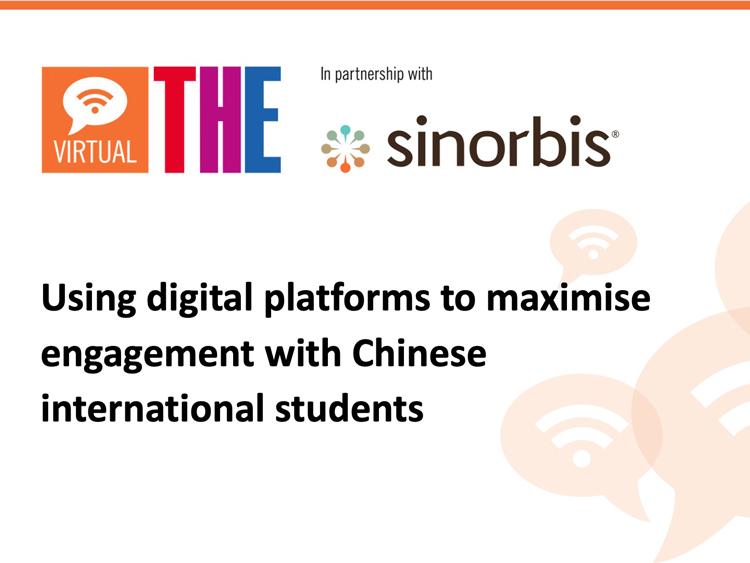
Bridging the digital divide in China

Watch the webinar here.
Recruiting international students has become a lot more challenging since the Covid-19 pandemic struck. Many recruiters have found that the possibilities offered by remote study and ongoing uncertainty have led to a reluctance to study internationally. Attracting students from China brings additional challenges.
Speaking at a Times Higher Education webinar held in partnership with Sinorbis, Nicolas Chu, CEO and founder of Sinorbis, discussed China’s unique digital ecosystem. Popular platforms such as Google or Facebook, which universities might use to promote themselves in the US and Europe, are neither accessible nor popular in China. In their place, the country has WeChat – a huge social platform with about 1.2 billion active users, alongside a number of smaller players.
“Even having a website that works well in China is not a given if you don’t have a presence on the ground,” explained Chu. He estimated that 85 per cent of Western websites load too slowly in China to be useful and users get a negative impression of those brands as a result.
China’s new Personal Information Protection Law came into effect in late 2021, governing how organisations process personal information. Dan Harris, an attorney with Harris Bicken, warned universities looking to expand their recruitment marketing into China to “be cognisant of what’s going on with politics in China as well as the law”.
The new law is low on detail and Harris added that the Chinese government is more likely to crack down on institutions that go against the country’s politics than consistently enforce sanctions on every transgression. “In the US, data privacy legislation is geared towards protecting companies; in Europe towards protecting individuals; and in China the government,” he said.
So how can Western universities engage with Chinese students? Chu explained there are two priorities: a website optimised for the Chinese market, and a university WeChat account. To host either of these in-country would require an internet content provider licence registered to a Chinese national, but this process can take years and is expensive.
Some organisations look to China-based third parties to host their web presence, but this can cause issues with ownership because that partner potentially “owns” your followers – this happened to Australian prime minister Scott Morrison, whose WeChat account was taken over by a propaganda group earlier this year.
Harris urges institutions to err on the side of caution, looking to European Union and US data privacy regulations as a guide. In terms of the communications, a platform such as Sinorbis will ensure content is visible and optimised for Chinese search engine algorithms. Aside from that, the approach is similar to other student recruitment markets: tell a compelling story to tailored audiences.
“Ensure your content is adapted to who you’re interacting with, [for example]...a prospective student [or] a parent,” Chu advised. Students often check WeChat for information about universities and rely heavily on the opinions of alumni, friends and family, so it’s crucial to tap into these channels as well.
Finally, while a hosting platform can improve access to potential recruits, it’s all about shared responsibility. This includes keeping an eye on compulsory consent boxes and having an up-to-date compliance policy in Chinese languages. “We ensure our platform is available, stable and secure, but clients are responsible for reviewing their data strategy and policies to ensure they are compliant,” Chu concluded.
The panel:
- Nicolas Chu, CEO and founder, Sinorbis
- Julia Gilmore, special projects content manager, Times Higher Education (chair)
- Dan Harris, attorney, Harris Bicken
Watch the webinar here.
Find out more about Sinorbis.
Key Details
Using social media and messaging platforms is a given in international student recruitment, but in China it’s not that straightforward

